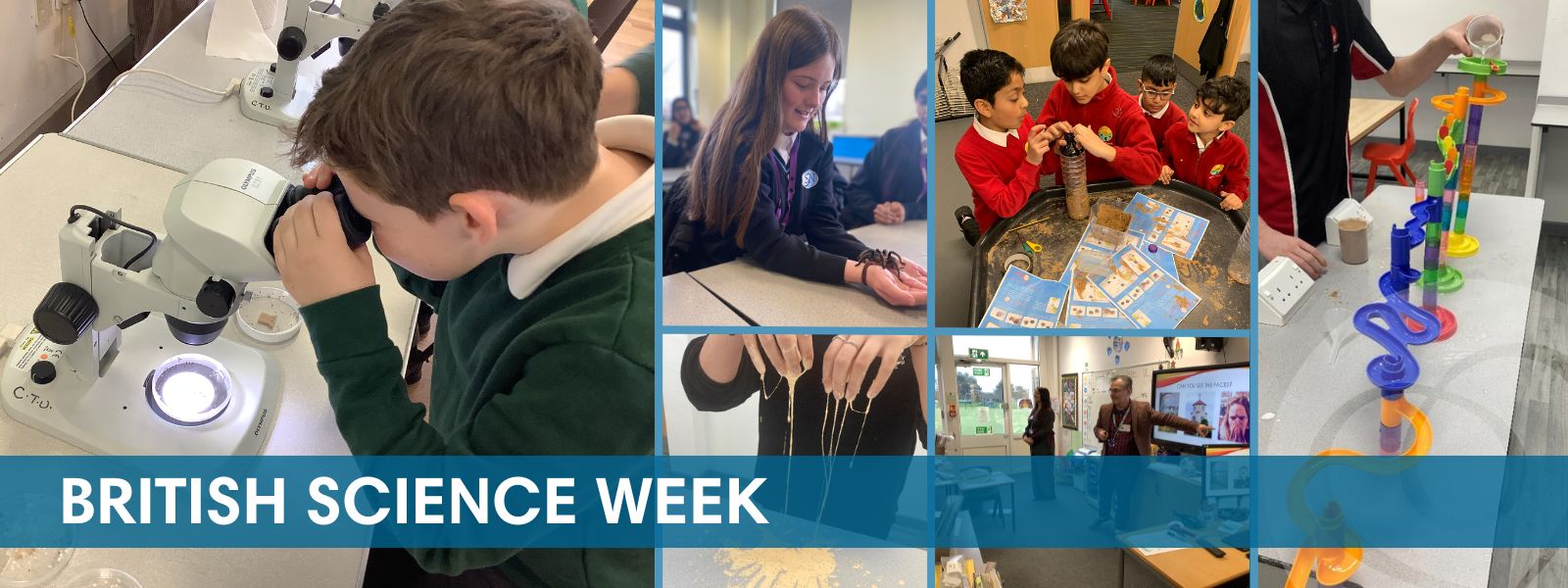March 20, 2024

British Science Week
Recognising the important opportunities participation in British Science Week would bring, of course our Leicestershire schools couldn’t wait to inspire young minds through a variety of science-themed practical activities!Running from the 8th – 17th March, this year’s theme centred around time. Here’s the round-up of what some of Lionheart’s primary, secondary and alternative provision schools got up to:
Brocks Hill Primary School:
A host of acclaimed scientists descended on Brocks Hill carrying out a series of engaging scientific experiments with the children in their year groups, while speaking about their own scientific areas of interest.
Year 1 and 4 pupils listened intently to Dr Tom Matheson, who spoke about the characteristics of locusts and their unique ability to jump. Such was their level of excitement, pupils were very good at showcasing their understanding through bouncing around in a fashion not too dissimilar to a swarm of locusts!
Quite the contrast in Year 2, where things were much slower and more measured. Acknowledging this year’s theme, children used their observation skills to gather data and used stopwatches to measure how fast snails could move; some pupils are still waiting for theirs to finish!!
Professor Ezio Rosato spoke to Year 3 about circadian rhythms in fruit flies, whilst Year 5 pupils had a real eye-opening lesson – literally. They learnt about how their eyes worked and how opticians test vision.
Lastly, Year 6 were visited by Dr Nicola Royle from the University of Leicester who gave a fascinating talk about genetics and DNA in living things. The children then enjoyed getting hands-on as they extracted the DNA from a variety of different fruits.
The Pioneers’ Centre:
Students at The Pioneers’ Centre – Lionheart’s alternative provision school – enjoyed a captivating week. Shifting into reverse, they took a trip back in time and learned about some major scientific events and discoveries, even using salt dough to construct their own ancient fossils.
After firing up the flux capacitor and returning to the present, students explored different ways to measure time. Utilising their observational skills, they used sand, water and stop watches to measure their own reaction times, before recording the data.
It was then time for them to roll up their sleeves, don their aprons and head to the kitchen where they followed a cooking recipe; on the menu? Slime! They judged each other’s entries on both appearance and how fast it flowed down a ramp!
Highcliffe Primary School:
Children had fun engaging in a series of activities that revolved around ‘Time’, creating their own sand timers, water clocks and pendulums before things took an artistic turn.
Breaking out the pencils and crayons, pupils set about designing time-themed posters, with a selection entered into the British Science Week’s national competition where they stand to potentially win a host of fantastic science-themed prizes – fingers crossed for a Highcliffe victor.
Year 5 and 6 enjoyed a visit from science specialists who gave inspiring talks about the abundance of careers and opportunities that exist within the STEM industry. Watching on awestruck, the eye-opening talks introduced pupils to the limitless possibilities available to them should they wish to pursue a scientific occupation in the years to come.
Sir Jonathan North Girls’ College:
Resembling a scene from ‘I’m a Celebrity Get Me Out of Here,’ the Party Animals Company rocked up at Sir Jonathan North for British Science Week - and they didn’t come alone; far from it in fact!
Instead they were acompanied by a host of exotic animals, including a skunk, a boa constrictor, a tarantula, a meerkat and a millipede, to name a few.
Students learned about the creatures’ respective behaviours and how they adapt to survive in their environments. Those brave enough were even permitted to handle some of the creatures, whilst others watched on… …through their fingers!
Hallam Fields Primary School:
The pupils were certainly kept busy, completing a brain-stretching six experiments in just three days!
Working in mixed age-groups, they enjoyed constructing aeroplanes out of paper straws, making sand timers and pendulums and investigating how some of their favourite animals adapt to their environment.
Riverside Primary School:
It was off to the Main Hall for the children of Riverside on Monday morning, as they kicked off British Science Week in style with a whole-school assembly from a local scientist, who hosted a thought-provoking session about the future of hydrogen-fuelled transport.
Throughout the day, each class excitedly took part in a number of experiments, which they were able to reflect on at the end of the day with their parents and carers.
Phew! What a busy week! It’s safe to say that all Lionheart learners enjoyed an engaging and practical week, in which the learning of an important core subject was well and truly brought to life!
British Science Week – an annual event hosted by the British Science Association – is a 10-day celebration of science, technology, engineering and maths; more commonly known as STEM subjects. Find out more at https://www.britishscienceweek.org/































